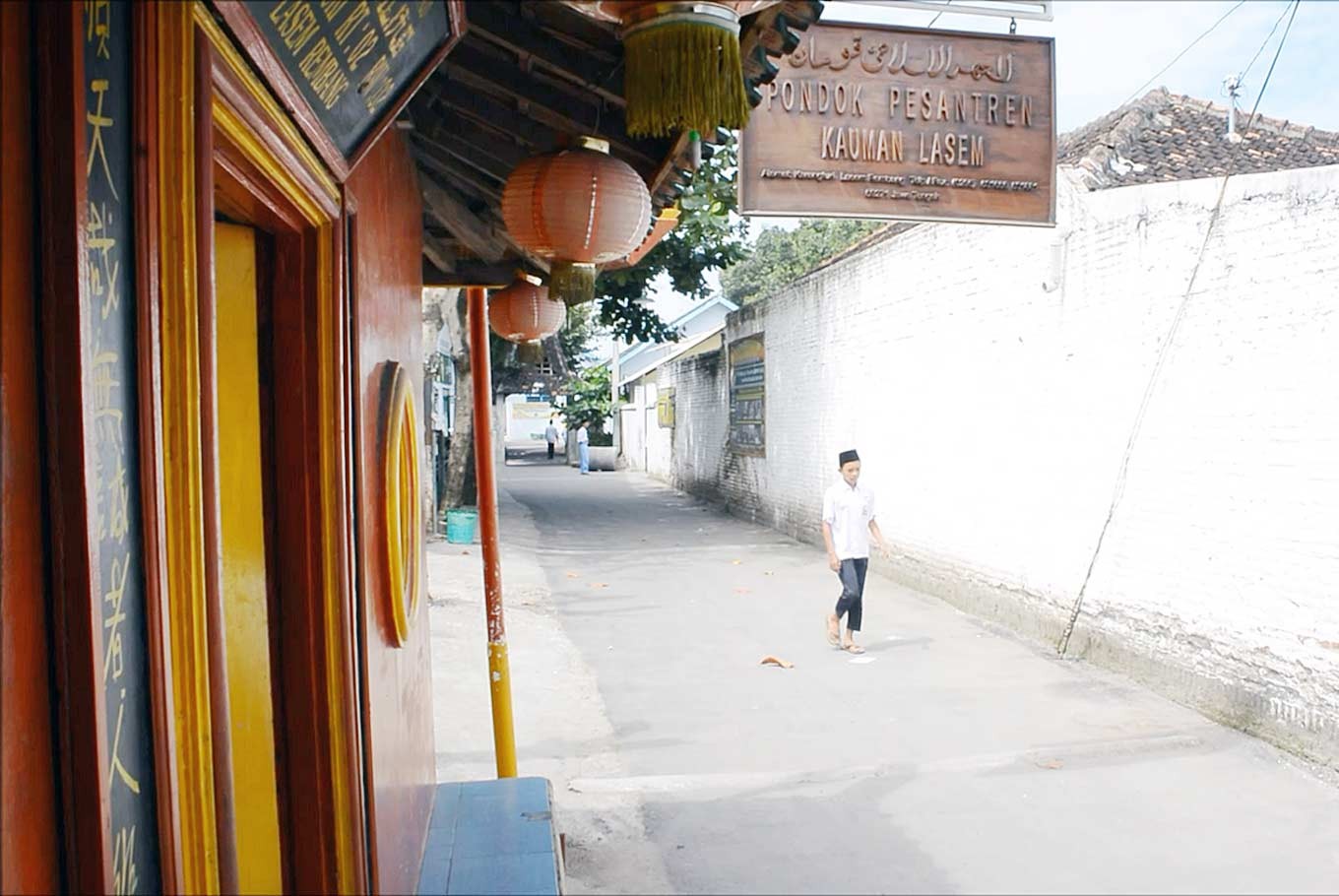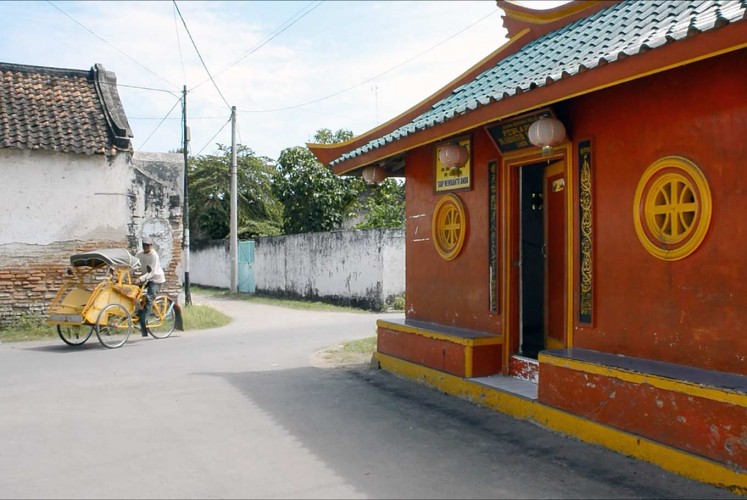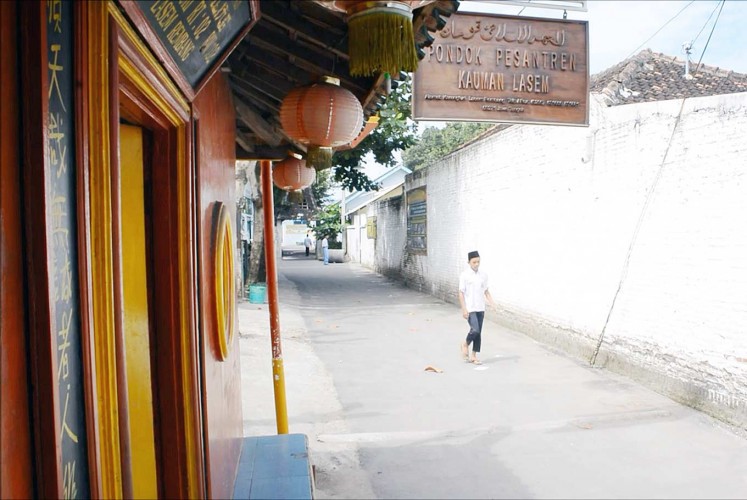Karangturi a haven of tolerance
A village in Rembang, Central Java, is a perfect example of how a civilized society should live in tolerance.
Change text size
Gift Premium Articles
to Anyone
 Best of both worlds: A student enters the gate of the Kauman Islamic Boarding School which features Chinese traditional lanterns. (JP/Kusumasari Ayuningtyas)
Best of both worlds: A student enters the gate of the Kauman Islamic Boarding School which features Chinese traditional lanterns. (JP/Kusumasari Ayuningtyas)
A
small structure painted red and yellow at an intersection in Kampung Karangturi looks like a shrine for followers of Confucianism.
Karangturi in the district town of Lasem, Rembang regency, Central Java, is indeed known as a settlement of ethnic Chinese people.
Various typically Chinese trivial ornaments also decorate all parts of the building, while in fact, this attractive construction is a security guard station and at the same time serves as the entry gate of Ponpes Kauman, Lasem’s Islamic boarding school.
The school has an old mushola (prayer house) made from carved wood, which still functions as the students’ place of worship and Koran recitation. The front part of this mushola is adorned with red lanterns, which can also be found in all corners of the school.
The school’s main building, which includes a sitting room and the residence of its owner, KH Zaim Achmad “Gus Zaim” Ma’shoem and his family, is also steeped in Chinese ambience, with lanterns and old Chinese characters on both entrance doors, translating as “May your life be as high as Mount Himalaya” and “May your fortune be as deep as the Indian Ocean.”

These words were already there when Gus Zaim bought the building from all Chinese resident.
He has chosen to retain the characters written in golden ink as they are unique, because all his neighbors of Chinese descent wiped out such wise words on their doors during the New Order regime, which banned everything related to Chinese culture.
Around 400 youths are studying at the school managed by Gus Zaim.
Dressed in clothing that makes them identifiable as Muslims, the santri (students) are amiable and friendly toward local residents. One afternoon, over a dozen of them halted in front of houses on one roadside of the settlement, removing weeds and sweeping the sidewalk.
“It’s a kind of social devotion work as our routine activity and also a form of sanction for santri who play truant from school or fail to do their homework,” Gus Zaim told The Jakarta Post in a recent interview.
The entire population in Kampung Karangturi is ethnic Chinese, mostly embracing the Catholic and Confucianist faiths.


According to Gus Zaim, since his school was set up there has been no friction between ethnic Chinese residents and school students and custodians.
“There are those trying to light a fire of conflict but I guarantee there’s no fuse here,” he said.
The house of neighborhood unit chief Kristianto shares a wall with part of the school building.
As an ethnic Chinese Catholic, Kristianto claims he is never disturbed in the least by the presence of the Islamic school. He gave an example as the noon adzan (call to prayer) was heard.
“It’s a low tone. My house is very close to it but it isn’t loud at all, nobody’s disturbed,” Kristianto said.
The soft adzan tone is one of the school’s attempts to preserve good relations with the surrounding community.
The school students and management are also actively involved in various social events and eagerly participate in local people’s traditional ceremonies or celebrations.
Similarly, in some important school programs or occasions, residents readily offer their assistance. When the school has fast-breaking gatherings, for instance, local people prepare food.
“If the school personnel cannot come, they will send their students to help us deliver the cooking,” Kristianto said.
Kristianto added that the shrine-like security station at the school entrance used to be unattractive and improperly maintained, just serving as a neighborhood guard post.
Later the Islamic school management renovated the structure and Kristianto designed its model with the approval of the school.

As a symbol of acculturation and tolerance, both its doors bear hadiths as recounted by Imam Bukhari and Imam Muslim, written in Arabic and Chinese characters. The sayings more or less mean that those whose neighbors do not feel secure because of their malevolence are devoid of faith.
The close association with the adjacent community has caused the school owner to be frequently called a kafir (unbeliever) by his ulema peers. They often quote a hadith story by Abdullah bin Umar that says “Whoever behaves like a certain group belongs to the group.”
“Actually this is only part of the dialectics of social life, and it is sharia [Islamic law], it is our teaching that we understand and consider a truth for us in the context of social interaction, social existence,” explained Gus Zaim.
There’s no excessive fanaticism in any teachings imparted by the school to its santri. According to Gus Zaim, fanaticism will just make somebody a closed individual, unwilling to accept differences.
“Islam in Indonesia cannot be likened to Islam in Saudi Arabia; it’s different. Professing a religion in Indonesia shouldn’t be fanatical because differences should be tolerated, nothing should be uniform,” Gus Zaim said.









